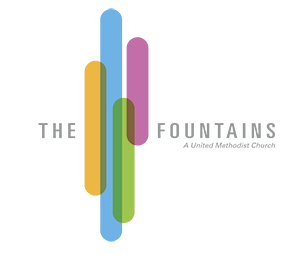
 The first Sunday of the month is The Fountains’ traditional Communion Sunday. In response to pandemic “social distancing,” you may have heard about some churches providing/delivering elaborate “pre-blessed communion kits” or “single serve communion cups” (in disposable coffee creamer-style “pods”), “drive-through” communion, and other attempts to try and provide as traditional a kind of communion experience as possible. Out of an abundance of caution health-wise, The Fountains’ will NOT be distributing anything to people’s homes. And theologically, it seems that people are getting worked up over the most superficial aspects of communion, the “authority” of clergy, a loss of “control” over the sacred, and generally missing the whole point. So, here’s a brief rationale for how we’ll be observing communion in our homes (keeping in mind that this is a developing practice and subject to change!).
The first Sunday of the month is The Fountains’ traditional Communion Sunday. In response to pandemic “social distancing,” you may have heard about some churches providing/delivering elaborate “pre-blessed communion kits” or “single serve communion cups” (in disposable coffee creamer-style “pods”), “drive-through” communion, and other attempts to try and provide as traditional a kind of communion experience as possible. Out of an abundance of caution health-wise, The Fountains’ will NOT be distributing anything to people’s homes. And theologically, it seems that people are getting worked up over the most superficial aspects of communion, the “authority” of clergy, a loss of “control” over the sacred, and generally missing the whole point. So, here’s a brief rationale for how we’ll be observing communion in our homes (keeping in mind that this is a developing practice and subject to change!).
THE WHY OF IT:
- In the United Methodist tradition, Communion is a Memorial meal — we are remembering what Jesus practiced: going out of his way to welcome those whom society have isolated as “unclean” (whoah, wait a second! That’s sounding a little closer to home for all of us these days)
- To put it bluntly, there’s not some “magic” that happens to the elements to somehow make them objectively more potent spiritually. The “magic” of communion is in followers acting out the manner in which Jesus welcomed everyoneto join in the meal — especially those who would otherwise be excluded.
- There are no official elements prescribed or officially authorized by the church. A wide variety of “bread” is used: leavened and unleavened bread, crackers, those suspect Styrofoam-like wafers, or the strange little bread-like “pellets” some of us may remember from years ago. Likewise, a wide variety of contents are offered in the typical “cup” – real wine, grape juice (of various colors), and, in Wesley’s “Love Feast,” water is used. So, take this variety as a demonstration of the flexibility of the ritual. The specific elements themselves are not important.
- Communion is what our tradition calls a “sacrament.” Remembering that the word “sacrament” is from the Latin sacr?mentum (and sacer), meaning to consecrate, to make “sacred, holy,” we are simply making an everyday “something” (like bread and grape juice) sacred or holy.
- When it comes time for Communion in the course of The Fountains’ “studio” celebration, participants will be invited to turn to the prayers that follow this explanation (see below) and join with one another in “sharing” a communion experience that is an authentic observance linking our faith community across time and distance.
THE HOW OF IT:
- Remembering that the model for modern communion were just typical meals in Jesus’ day, we will encourage you to designate a meal in which you can be intentional about making “sacred.” This can be any meal at any time (acknowledging that people are dialing in to watch the “studio” at various times over the course of several days).
- Following is a written prayer of “consecration” and a grace to either recite or sing. You are invited to be still and center yourself before the meal, letting go of the stress and anxiety of the day, and taking a few deep breaths.
- Light a candle if you’d like and read the “prayer of consecration” provided. Then recite or sing the grace and then enjoy your meal, grateful for the blessing of food in the midst of crisis and mindful that, in ways that this pandemic has made all-too-clear, we are interconnected with one another as human beings across the globe. As followers of Jesus, we are committed to living out his call to “do justice, love kindness, and walk humbly” in the way of the Spirit.
If your meal includes a glass of wine and some bread, great! If not, no problem! If it is on-your-own or with others, no problem! The important things to remember are:
- we are part of a community that is connected with one another beyond our mere physical presence and,
- as individuals, we have the “authority” to make every moment (not just meals) sacred. In fact, the more mindful we are of the wonder and fragility of the gift of life, the more sacred every moment becomes.
These are not typical times. Attempts to try and desperately cling to the old ways of doing church are likely doomed to feel forced and artificial. Let us embrace the challenge of re-creating the “how” of what we do, knowing that the “why” hasn’t changed at all: As followers of Jesus, we put love first!
_______________________________
Words of Blessing and Consecration
You are invited to be still and center yourself before the meal. Let go of the stress and anxiety of the day, and take a few deep breaths. Light a candle if you’d like and read the words of consecration below.
**************************
Jesus said:
I am the bread of life.
Those who come to me shall not hunger,
And those who believe in me shall never thirst.
No one who comes to me will be cast out. (John 11.28 & 29)
Happy are those who hunger and thirst to do what is right,
for they shall be filled. (Matthew 5.6)
We pause with thanksgiving, especially mindful of the blessing of this meal.
We acknowledge the presence of the Spirit with us here and now, a Spirit that connects us not only with our brothers and sisters from The Fountains, but with all those, everywhere, who share in the gifts and challenges of living life.
May this meal be a part of the nourishment we seek, strengthening us to make Jesus’ call on our lives real in the world. United in our longings for healing and transformation, may we be motivated and inspiried to live with courage, hope, and generosity.
(Sing or recite)
God bless to us our bread,
And food to all those who are hungry,
And hunger for justice to those who are fed,
God bless to us our bread.
Amen.
The Fountains
#weputlovefirst
April 2020

